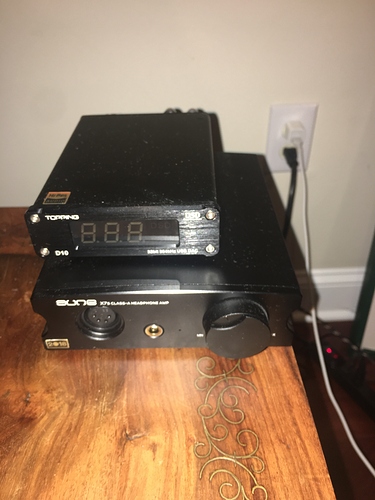I would agree
We had two amps in a room with a pair of ls50’s, and he had a bryston amp and a krell amp. They were of similar caliber and price. Also had super similar measurements and power ratings. He bought a diy speaker terminal switcher switcher (kinda wish I had one) so he could compare the two and return the one he liked less, and I was curious if I could tell them from each other. After properly volume matching with a spl meter, we had one of us go behind a couch and switch the inputs randomly for a couple of minutes, and then had to pick out which was which. I remember picking them correctly because the krell amp had something different about the presence area and was slightly sharper there, where the bryston sounded more even to my ears. I did hear both amps a day earlier though. It was nowhere near a scientific test and we were just messing around at that point. I’m sure there are many flaws, but most people won’t have a perfect setup either. I couldn’t tell the difference from balanced to unbalanced in that setup though, after they were volume matched
Like I said, if everything was perfectly engineered there would be no perceivable differences. But manufacturers gotta do something to differentiate themselves in the higher end market
And another thing is that no one is forcing you to spend money on a nicer amp if you don’t feel that there is a difference. I’m sure that some people are definitely mislead, and that’s why if I recommend anything it’s always going to be conservative and the best value possible, as my goal isn’t to push anything on anyone.
You also have to consider the human brain when you talk about ABX testing. I feel the better way to test something like amps is to spend a lot of time with each amp and really let you get a sense of all the properties about it. Your brain can’t really fully process short abx testing. But that could be said about any method as well. The brain is not a machine and alters results of everything we do. There are so many ways your brain can be tricked and altered
Another thing to think about is that these are very small differences in sound. People kinda have to be familiar with both the amps and spend adequate time to really pick up on difference. If you just take a random sample of people and let them find a difference between something they have never heard before, I’m not surprised they can’t tell a difference. It would be like showing people a painting with slight differences in the colors and lines, and letting them look at it for a few minutes, and then show them the other painting. People are going to have a pretty hard time finding the differences. If you let people spend a few days familiarizing themselves with the subject material, it’s going to be pretty likely that you have more people spot the differences. ABX testing is a scientific way of comparison, but it doesn’t necessarily mean it will lead to results that tell the whole story. There are plenty of other methods of discrimination testing that could yield different results
I’m just going to pick the better thing to my ear, and something that sounds better to me. There’s more that goes into something “sounding good” then just the sound. The ideal goal of this hobby is to enjoy the sound, and if someone decides to throw money at expensive cables, it’s their choice, and actually might influence their brain to perceive their setup to sound better to them. It’s pretty impossible to remove your brain from the equation unfortunately. (not advocating for expensive cables here, just an example) You just have to account for that, and that in its self is why placebo lives in this hobby. But I definitely don’t like the false scientific claims in audio, as there is a difference from recognizing placebo and accepting it vs trying to claim something as scientific fact when it is clearly not
